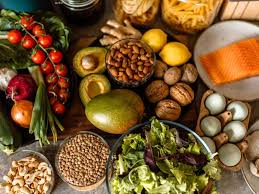Your body relies on six essential nutrients to function properly—even in small quantities. These nutrients include proteins, carbohydrates, fats, vitamins, minerals, and water.

These vital components are required for basic body functions and overall health. Because your body either cannot produce them at all or not in sufficient amounts, you must get them through food.
Experts typically classify essential nutrients into two major categories:
-
Macronutrients: Needed in larger amounts, these nutrients provide the energy your body needs to operate. They include protein, carbohydrates, and fats.
-
Micronutrients: Needed in smaller quantities, vitamins and minerals are critical for functions like immune support, metabolism, and cellular repair.
Read on to explore each of these six nutrients and understand why your body depends on them.
1. Protein
Protein serves as one of the body’s main structural and functional components. From your muscles and skin to hair, hormones, and enzymes, every cell in the body relies on protein for repair, maintenance, and growth.
Your body turns to protein to build and support tissue, although it typically doesn’t use it for energy unless there’s no other fuel source.
Proteins are made from amino acids, some of which your body can synthesize, while others—known as essential amino acids—must come from food. The good news is that you don’t have to consume all amino acids at one time; your body can build complete proteins using various sources throughout the day.
Protein-rich foods include:
-
Eggs
-
Poultry (chicken, turkey)
-
Red meats (beef, lamb, pork)
-
Fish and seafood
-
Dairy products
-
Beans and lentils
-
Nuts and seeds
According to the Dietary Guidelines for Americans, protein should account for 10% to 30% of your daily calorie intake, depending on your age, sex, and activity level.
2. Carbohydrates
Carbs are your body’s main source of energy. They help regulate blood sugar and fuel the brain, muscles, and other essential systems.
The Dietary Guidelines for Americans suggest that 45% to 65% of your daily calories should come from carbohydrates.
There are two major types of carbs:
-
Complex carbohydrates: These digest slowly and provide steady energy. They’re packed with fiber and nutrients.
-
Simple carbohydrates: These break down quickly, leading to rapid spikes in blood sugar.
Examples of carbs to include in your diet:
-
Fruits
-
Vegetables
-
Whole grains
-
Legumes and beans
Carbs to reduce or avoid:
-
Refined grains
-
Candy and sweets
-
Pastries
-
Sugar-sweetened beverages (soda, sweet tea)
-
Foods with added sugars
3. Fats
Fats, or lipids, are vital for absorbing certain vitamins and providing long-lasting energy. While fat contains more calories per gram than protein or carbs, it plays a key role in overall health.
The U.S. guidelines recommend that 20% to 35% of your daily calories come from fat, though the World Health Organization suggests keeping it below 30%.
Types of fats:
-
Unsaturated fats: These are considered healthy fats and are found in foods like olive oil, nuts, seeds, and fatty fish. They provide essential fatty acids your body can’t create.
-
Saturated fats: Overconsumption of these can raise LDL (bad) cholesterol. They’re found in butter, red meat, cheese, and many desserts.
Aim to prioritize healthy fats while limiting saturated and trans fats to protect heart health.
4. Vitamins
Vitamins are critical for numerous functions, from supporting your immune system to aiding in growth, vision, and organ health.
-
Fat-soluble vitamins (A, D, E, and K) are stored in the body’s fat and help with things like bone health and blood clotting.
-
Water-soluble vitamins (like vitamin C and B-complex) aren’t stored as easily and must be replenished regularly. They assist in energy production and maintaining healthy skin, nerves, and cells.
Common sources of vitamins:
-
Fresh fruits
-
Leafy greens and other vegetables
-
Whole grains
-
Animal products such as dairy, eggs, and meats
If you suspect a deficiency, speak with a healthcare provider—they may recommend dietary supplements.
5. Minerals
Much like vitamins, minerals are key for your body to operate efficiently. They help with everything from bone strength and hydration to nerve signaling and metabolic regulation.
The National Institutes of Health (NIH) highlights the following essential minerals:
-
Calcium
-
Potassium
-
Magnesium
-
Iron
-
Zinc
-
Phosphorus
-
Sodium
-
Iodine
-
Copper
-
Fluoride
-
Selenium
-
Manganese
-
Chromium
-
Molybdenum
Sources of minerals include:
-
Meats and seafood
-
Eggs and dairy
-
Fresh produce
-
Legumes and whole grains
Eating a wide variety of nutrient-dense foods can help ensure your mineral needs are met naturally.
6. Water
Water is the foundation of life—it makes up about 60% of your body weight and is essential for nearly every bodily function.
According to the CDC, staying properly hydrated helps:
-
Cushion your joints
-
Regulate body temperature
-
Flush out waste and toxins
-
Protect your brain and spinal cord
Dehydration can lead to symptoms like fatigue, headaches, dizziness, and constipation.
Best hydration sources:
-
Plain water
-
Herbal teas or other low-sugar drinks
-
Water-rich fruits and vegetables (like cucumbers, oranges, and watermelon)
To monitor hydration, check your urine color—light yellow or nearly clear indicates adequate fluid levels.
Final Takeaway
Your body needs six essential nutrients to stay strong, energized, and healthy: protein, carbohydrates, fats, vitamins, minerals, and water.
A well-rounded, balanced diet filled with whole grains, lean proteins, fruits, vegetables, and healthy fats is the best way to ensure you’re meeting your nutritional needs.
For long-term wellness, focus on variety, moderation, and hydration—your body will thank you.

